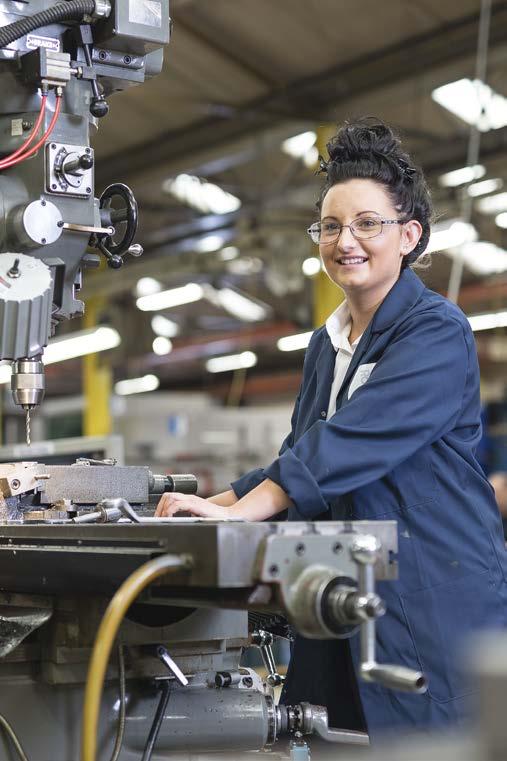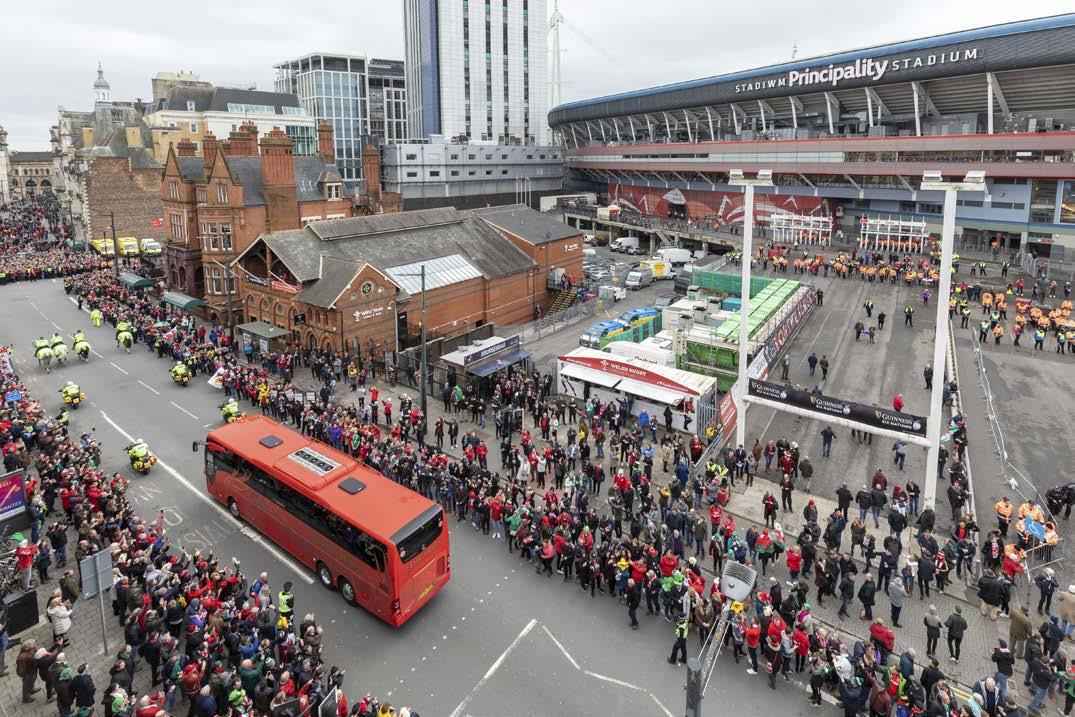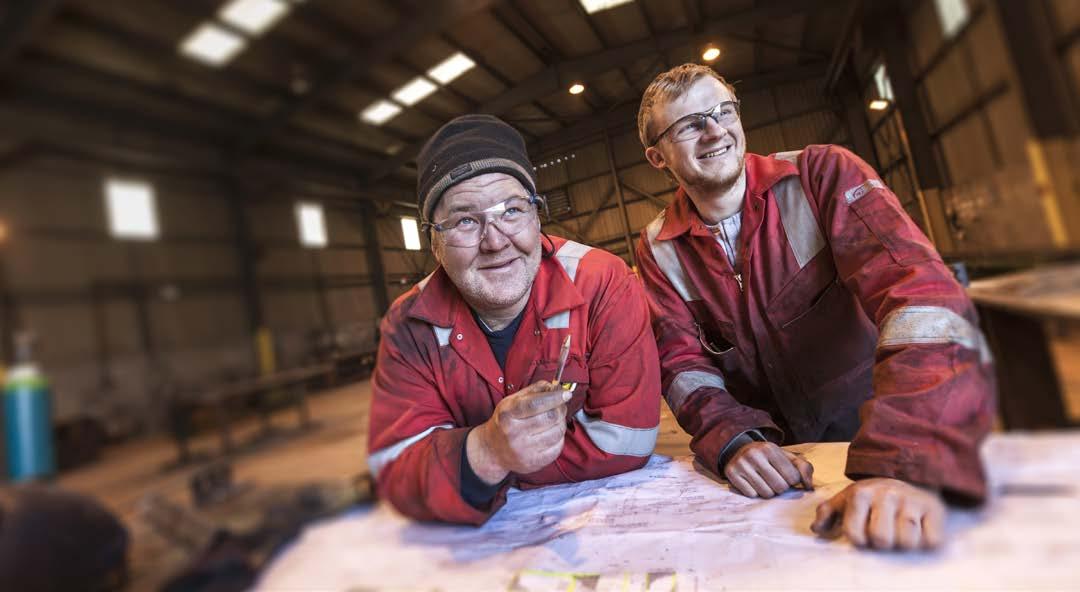
7 minute read
More Prosperous
The most effective way to help people out of poverty is through secure and fair work. We aim to use the levers available to us to support a prosperous economy, providing people in Wales with a decent quality of life and recognising that those with the greatest need may require additional support. The employment rate in Wales reached a record high of 76.2% in the last three months of 2018 and has remained high in historical terms. While this is encouraging, we want to see an economy built on high skills, higher productivity and fair pay and conditions. We also want to remove barriers to employment and progression for the vulnerable.
Supporting people and businesses through fair work and employability
People should be able to expect fair work and be treated with dignity and respect in the workplace. We have accepted the Fair Work Commission’s recommendations and are developing a Fair Work Strategy, to make Wales a Fair Work nation. We are consulting on a Social Partnership Act to put our successful social partnership model on a statutory footing. Everyone in Wales should have the support they need to find rewarding and fair work. We launched our employability support service Working Wales in May 2019, and the service has already supported 12,000 adults and 3,300 young people. We invested £116m in apprenticeships in 2018-19 and we have delivered more than 74,000 apprenticeships – we’re on track to meet our commitment of 100,000 all-age quality apprenticeships by the end of this Senedd term. We have helped more people with health problems to stay in work – the In Work Support Service helped nearly 3,000 people to remain in work and a further 1,200 to return to work. This year we announced an additional £9.4m of funding which will extend the service until December 2022, providing support for up to 12,000 people. One hundred employers have signed up to the Healthy Working Wales Award, which supports employers, individuals and health professionals to help working age people to stay fit and healthy. We continue to embed our Economic Contract and have agreed more than 200 economic contracts with businesses. We are investing in the Foundational Economy – we launched the £4.5m Foundational Economy Challenge Fund, which as of January 2020 is supporting more than 50 innovative projects across Wales and working to spread the benefits of local spending in the local economy.

Vibrant and resilient communities, culture and business
Wales needs supportive, inclusive and vibrant communities, enriched by our Welsh national culture, language and identity. We continue to deliver our Cymraeg 2050 strategy in order to reach our target of a million Welsh speakers and to increase the percentage of the population that speak Welsh daily. The strategy is supported by annual action plans. We have worked with a number of organisations, including the National Eisteddfod, the Urdd and the Mentrau iaith to deliver on Cymraeg 2050. We are developing an internal Welsh strategy to become a national exemplar in promoting and facilitating the Welsh language. We have rolled out services, including the childcare offer, bilingually to ensure people can receive services in Welsh. The £2m Arfor Innovation Fund supports business, community and entrepreneurial initiatives which promote the Welsh language in West Wales. In July 2019, we published the More Than Just Words action plan 2019-20, which sets how we will deliver health and social care services in Welsh. Thriving high streets are a crucial part of inclusive, vibrant communities, and our programmes will have enabled £800m investment in town centres by 2022. Our innovative Town Centre Loans scheme has provided £31m of funding and this year we launched a £2.1m Town Centre Property Investment Fund to bring empty buildings back into use. We have made significant investments in the facilities at the heart of communities. In 2019-20 we allocated £5m additional capital funding to Sport Wales which has helped more than 120 different sports clubs and organisations improve their facilities in each local authority area. We also provided more than £1.4m to support major capital improvements to 11 libraries, museums and archives across Wales. Our major events unit supported 28 cultural and sporting events in 2018, attracting more than 230,000 visitors to Wales, supporting 965 jobs and contributing £42m to the Welsh economy. These include the Newport Wales Marathon, the 2018 Tour of Britain and the Focus Wales international music and art showcase in Wrexham. We have explored the possibility of setting up a community bank for Wales to maintain vital banking services in those communities, which have been affected by the closure of high street bank branches. Local businesses and entrepreneurs make our communities dynamic and fulfilling places. The Development Bank of Wales is managing more than £500m of support for businesses, helping entrepreneurs thrive. Business Wales helped create more than 1,040 new enterprises during 2018.

Modern infrastructure connecting communities
People and local communities need stable, integrated and reliable infrastructure. Building on the success of our Superfast Cymru programme, we are rolling out superfast fibre broadband to a further 26,000 houses and businesses. We have nearly doubled the number of premises with access to fast broadband since 2012, in an area where the UK Government has responsibility. We are making it easier for people to switch from their cars to other forms of transport, investing £30m to improve active travel – the biggest investment ever seen across Wales. Our Improving Public Transport White Paper sets out a bold vision for an integrated public transport system. Bus travel is the backbone of public transport in Wales. This year we announced £1m for a demand-responsive bus pilot and extended the MyTravelPass discounted bus scheme to 16 to 21 year-olds. More than 20,000 young people have taken 1.3 million discounted journeys since the scheme began. We are on a £5bn journey to transform rail services over the next 15 years. Transport for Wales inherited a challenging legacy but new rolling stock is being introduced across Wales, providing 6,500 more seats every week on the core Valley lines and, from January 2020, there are fare reductions across the rail network, putting money back into the pockets of people across Wales. This includes extending free travel to children under 11. We are investing in active travel and public transport to encourage people to use their cars less but we will continue to maintain and upgrade the nation’s roads. This year we began construction of the Caernarfon to Bontnewydd bypass, announced procurement plans to improve the A55 Flintshire corridor trunk road and continued to upgrade the A465 Heads of the Valleys road. In June 2019 we decided not to make the Orders for an M4 relief road. The South East Wales Transport Commission will consider and make recommendations on the opportunities, challenges and objectives for tackling congestion on the M4. To help reduce nitrogen dioxide levels, we have introduced 50mph speed limits at five locations across the road network. We also announced plans to extend 20 mph speed limits in residential areas to reduce emissions and improve road safety. We have allocated £4m to local authorities for schemes to prevent road collisions and are developing an electric vehicle charging strategy.
Tackling regional economic inequality and driving sustainable growth
Our Economic Action Plan supports a regionally-focused model of economic development to maximise strengths and address the needs of distinct places and communities – supported by programmes to build the skills we need for the future. Through the Tech Valleys project we are investing £100m to create around 1,500 sustainable jobs over 10 years to make Blaenau Gwent and the wider South Wales Valleys a globally-recognised centre for the development and delivery of emerging technologies. In September 2019, we announced plans for the National Digital Exploitation Centre (NDEC) in Ebbw Vale, including plans to work with local businesses and schools to increase digital capability. Alongside this our Valleys Taskforce is working with communities and local organisations to tackle the blight of empty homes, harness the potential of key towns and outdoor visitor attractions and improve local transport to create better jobs closer to home. The National Digital Exploitation Centre is an example of a magnet site – world class centres which draw in further investment, benefit whole regions and foster innovative ways of working. Other examples include the Advanced Manufacturing Research Centre in Broughton, which could increase the value of the Welsh economy by as much as £4bn over the next 20 years. The Digital Signal Processing Centre for Excellence at Bangor University will help make Wales a global leader in 5G technology.





